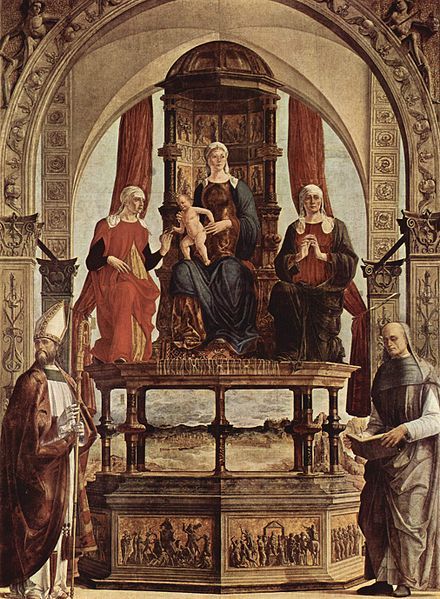 Today, February 21, we celebrate the feast of Saint Peter Damian (1007-1072), Cardinal Bishop, and Doctor of the Church. Saint Peter is remembered for a life of penance and austerity, and preached rigorous reform. He was a man of integrity and zeal for the Lord, who confronted immorality and dishonesty wherever he found it—beginning within the Church ranks among the clergy. His writings remain instrumental in clarifying Church doctrine on issues such as Purgatory, the Eucharist, the Sacraments, and Christian virtues.
Today, February 21, we celebrate the feast of Saint Peter Damian (1007-1072), Cardinal Bishop, and Doctor of the Church. Saint Peter is remembered for a life of penance and austerity, and preached rigorous reform. He was a man of integrity and zeal for the Lord, who confronted immorality and dishonesty wherever he found it—beginning within the Church ranks among the clergy. His writings remain instrumental in clarifying Church doctrine on issues such as Purgatory, the Eucharist, the Sacraments, and Christian virtues.At approximately age 28, Peter Damian gave up his teaching, and entered the Benedictine hermitage at Fonte Avellla, where he continued to live a life of prayer and austerity. Peter began experiencing significant health problems, as he forewent sleep in service to prayer, limited his food intake, and began to engage in bodily mortification- flogging himself and wearing a hair shirt. Forced to limit his practices, and spend time re-gaining his strength, Peter used his recovery time in study of the Scriptures. When healthy, he was assigned as teacher to his brothers in the order, and later to teach the public as well. He became renowned for his preaching—and was recognized for his sound judgment, fairness, and strict adherence to the teachings of the Church. Despite his orthodoxy, he was approachable and able to reach to all who came to listen to him.
In 1043, Peter Damian was appointed Prior of the house—a position he would hold for the remainder of his life. Under his direction, the monastery was expanded, with special attention paid to the library in which the great works of the Church were carefully collected and catalogued. Saint Peter Damian further founded many sister monasteries including: Monastery of San Salvatore di Monte Acuto at Perugia; Monastery of Saint Gregory in Rimini; Hermitage Suavicino; Preggio hermitage near Perugia; Hermitage Gamogna, Apennines Faenza (1053); monastery of San Giovanni in Acereto (now known as the Badia Valley), Faenza Apennines (about 1055); Monastery of San Bartoloemo in Camporeggiano at Fonte Avellana; Monastery of Santa Maria in Sitria at Fonte Avellana; and the Hermitage Ocri at Sarsina.
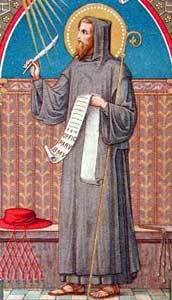 A friend of Pope Gregory VI, Saint Peter attended a Church synod in Rome in 1047, during which time he actively encouraged reform among the clergy. He specifically pressed Pope Gregory for an increase in clerical discipline, and supported his position with one of his most famous works, Liber Gomorrhianus (Book of Gomorrah), a moral blueprint for the times. In this text, he decried the vices of the clergy, including concern for worldly matters, money, simony (the buying of priests), and unchaste behaviors.
A friend of Pope Gregory VI, Saint Peter attended a Church synod in Rome in 1047, during which time he actively encouraged reform among the clergy. He specifically pressed Pope Gregory for an increase in clerical discipline, and supported his position with one of his most famous works, Liber Gomorrhianus (Book of Gomorrah), a moral blueprint for the times. In this text, he decried the vices of the clergy, including concern for worldly matters, money, simony (the buying of priests), and unchaste behaviors.Pope Gregory VI appointed Peter the Cardinal-Bishop of Ostia, Italy in 1057, where he continued to focus his efforts on reform. While maintaining his austere life of penance and mortification, overseeing the many houses of his order, and settling Church disputes, Saint Peter Damian found time to write prolifically. Dozens of sermons, hundreds of hymns and poems, over 170 letters, seven biographies of saints, and several books were produced during the latter years of his life.
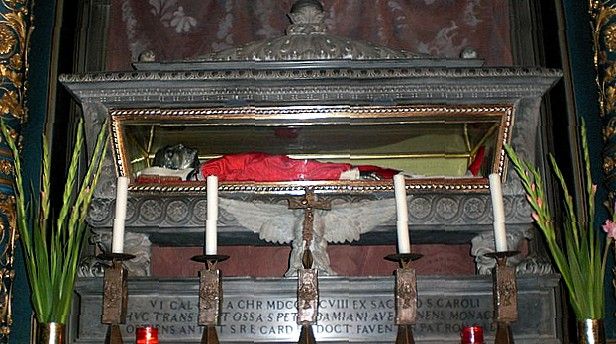 Saint Peter Damien died February 21, 1072 in Faenza. His brother monks surrounded him at the time of his death, reciting the Matins. His body- later found to be incorrupt—was buried in the church of Santa Maria Foris Portam (now known as Santa Maria Vecchia). Later his relics were translated to the cathedral of Faenza, where they are still venerated today.
Saint Peter Damien died February 21, 1072 in Faenza. His brother monks surrounded him at the time of his death, reciting the Matins. His body- later found to be incorrupt—was buried in the church of Santa Maria Foris Portam (now known as Santa Maria Vecchia). Later his relics were translated to the cathedral of Faenza, where they are still venerated today. Saint Peter Damian wrote the following words for those who visit his tomb:
"I was in the world what you are now, you'll be what I am now:
not believe the things you see will perish; frivolous are signs that precede the truth, are followed by brief moments of eternity.
Loud thinking about death because you can live forever.
All that is past, present, but what remains is approaching.
As one who has done so far left, or wicked world,
who died before the meat with the body than with the meat in the world!
Prefer to heavenly things earthly to the eternal deciduous.
The free soul back to its beginning;
the spirit to rise up and come back to that source which led,
look down below him that forces him down.
Remember me, I beg of you; look at the pitiful ashes of Peter;
with prayers and cries of "Lord, forgive him"
Saint Peter Damien was an instrument of reform, through which he encouraged the Church to embrace the teachings of the great Fathers of the Church, and return to a more penitential and focused practice of the teachings of Christ. Throughout his life, he counseled and preached all who would listen—from Church leaders and heads of state, to his brethren in the monasteries he founded, to laity from all walks of life. To each he encountered, he preached the same message of discipline, penance, and love. Today, on his feast day, we pause to consider our own lives, examine our consciences, and turn to the Lord renewed in our commitment to live a life of virtue and turn from sin. Saint Peter Damian, pray for us!
Select Quotations of Saint Peter Damian:
“Let us faithfully transmit to posterity the example of virtue which we have received from our forefathers.”
“It is not sinners, but the wicked who should despair; it is not the magnitude of one’s crime, but contempt of God that dashes one’s hopes.”
”The Master of heaven has placed us under the precept of self-denial – this is the rule of true humility – that we follow the right path. In those early disciples, who became doctors of the world, Christ has given the model of all virtues. Thus, until the consummation of the world any faithful soul can direct their gaze towards them and imitate them. We follow these rivers from which flows life until we reach the Source. We walk behind the soldiers to meet the King, Jesus Christ, our Lord, Who reigns with the Father and the Holy Spirit. Amen.”
All-powerful God,
help us to follow the teachings and example of Peter Damian.
By making Christ and the service of His Church
the first love of our lives,
may we come to the joys of eternal light,
where He lives and reigns with You and the Holy Spirit,
one God, for ever and ever. Amen.
Year 2: Day 52 of 365
Prayer Intentions: Lives of virtue; Turning from sin.
Requested Intentions: Healing, successful relationship (S); For successful marriage (A); For a husband’s freedom from addiction (C); Freedom from pain and illness for a friend (M); Financial freedom (J); Successful passing of occupational examination (S); Healing and conversion, sale of house (L); Occupational success for employee and colleagues (J); Employment for a son (C); Successful attainment of an important appointed position (J); Recovery from cancer for a friend (Z); For a family’s freedom from sin (M); For a daughter with Diabetes (A); Reconciliation of a marriage (D); Assistance with a legal matter, financial freedom (R); Healing for a friend (M); For a son in medical school (H); Financial assistance (M); Successful employment (N): Freedom from mental illness for a friend (L); For successful marriage (N); For friends having and recovering from surgery; for the reduction of a brain tumor (L); For resolution of a housing crisis (P); For a brother who is struggling financially, for a son who is struggling academically (B); For financial security for a friend (C); Success in business; familial happiness and health (J); Health and recovery of a sister (I); Healing of a father following stroke (S).







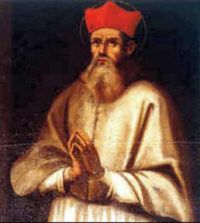
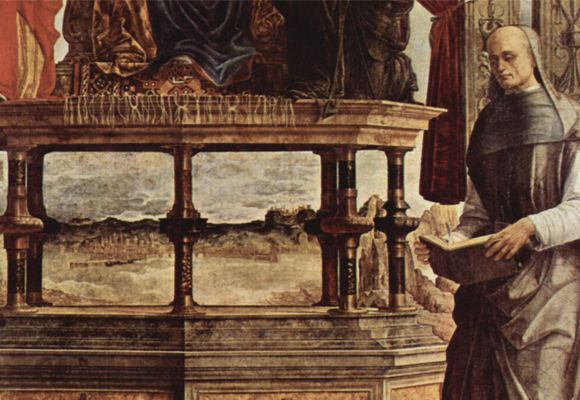
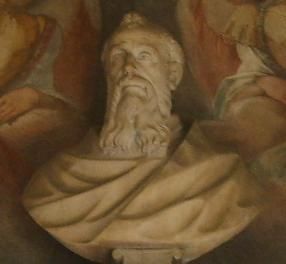
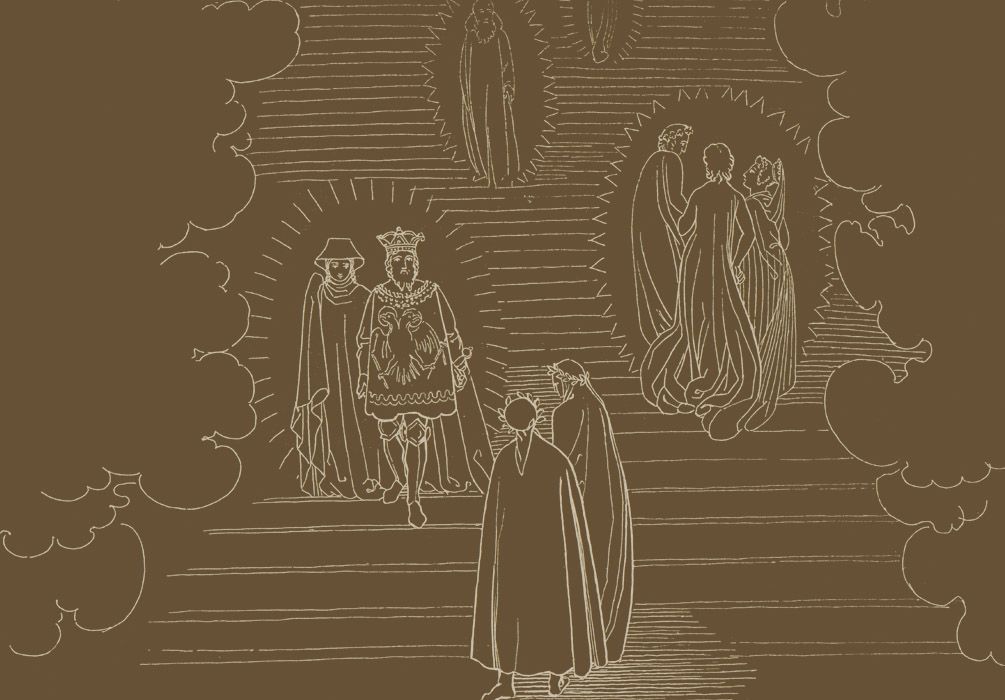
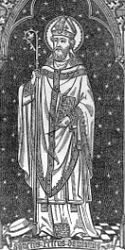

0 comments:
Post a Comment
Thanks for leaving a comment. If you wish to submit a prayer request, however, please do so above, using the "Contact" tab.